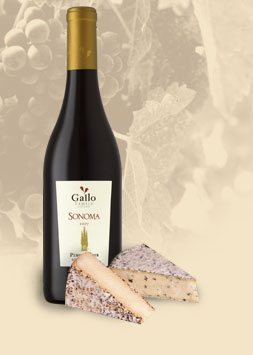 |
 |
|
Two French-type cheeses, very similar in taste and texture. In a cheese tasting, they are
difficult to tell apart. Camembert has slightly lower fat and a little more moisture, but
in taste it is quite the same as Brie. Of the two, Brie is the most widely known cheese.
Camembert has not gained as much popularity, except with cheese lovers. Pairs well with
sparkling wines and fruity reds such as Pinot Noir.
| Varieties
available: |
|
Domestic and imported |
| Types of millk used: |
|
Cow's milk, whole |
| Appearance: |
|
Flat, disk-shaped wheels;
whitish outside crust or flower; crust may have reddish-brown patches; straw yellow inside |
| Texture: |
|
Firm outside crust that is meant to be eaten;
creamy paste inside; should be uniformly soft inside; underripe it shows a white
chalk-like center; overripe (should not be eaten) it develops an ammonia-like odor. |
| Taste: |
|
A subtle, buttery flavor with
a hint of honey and mushrooms; rich taste; mild when young; more robust with age. |
| Uses: |
|
Cold appetizers - sliced,
served with crackers
Hot appetizers - baked, served hot with french bread (to bake: Place
whole Brie in a 350 degree oven for 5 minutes, until completely melted inside)
Dessert - sliced, served with strawberries, melon, pears, grapes, or
apples. |
 |
Wine Pairing Suggestions:
Gallo of Sonoma Pinot NoirA subtle, buttery flavor with a hint of honey and mushrooms
describes Brie cheese. Pair this with the bright raspberry, strawberry and cherry aromas
of Gallo of Sonoma Pinot Noir. A night you won’t soon forget. |
|
|
|
|
|